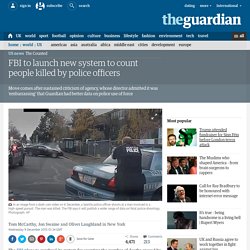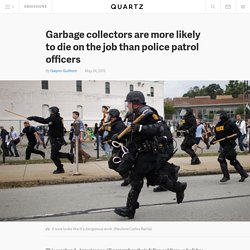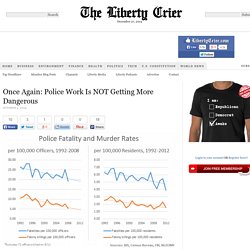

Once again: There is no ‘war on cops.’ And those who claim otherwise are playing a dangerous game. Here’s Fox News earlier this week, shamelessly exploiting a tragedy to gin up outrage.

They certainly aren’t the only ones. Here are some more examples of media outlets and politicians spreading the hysteria: As I’ve noted here before, we’re seeing similar rhetoric from politicians, particularly from GOP presidential hopefuls, including Donald Trump, Ted Cruz, and Scott Walker. All of this fact-free fearmongering is having an effect. A Rasmussen poll taken last week found that 58 percent of respondents now believe there is now a “war on police.” So let’s go through the numbers. But these are just the raw numbers. The other way you could measure the rate of killings of police officers is to look at the number with respect to the overall population. As you can see, by this measure 2015 is shaping up to be the second safest year for police ever, after 2013.
Any murder of a police officer is a tragedy. It also just makes for a miserable work life. That is something worth worrying about. FBI to launch new system to count people killed by police officers. The FBI plans to overhaul its system for counting the number of deaths caused by police in the US, according to federal officials, and will begin releasing information about deadly encounters involving the use of Tasers and other force, in addition to fatal shootings.

Responding to months of sharp criticism over its existing program for reporting fatal shootings by police officers, the bureau is to unveil a new system that will publish a wider range of data, resembling that currently collected by an ongoing Guardian investigation. Stephen Fischer, a senior official in the FBI’s criminal justice information services division in West Virginia, said it had “identified a need for more robust and complete information about encounters between law enforcement officers and citizens that result in a use of force”. The bureau has for several years published an annual total of fatal shootings by police officers that are termed “justifiable homicides”. Killed By Police - 2015. Garbage collectors are more likely to die on the job than police patrol officers. This weekend, Americans will remember their fallen soldiers, a holiday traditionally observed with barbecues and the Indianapolis 500 car race.

The US military isn’t the only industry that often asks the ultimate sacrifice of its workers. Some 4,585 American civilians died in the line of duty in 2013, according to data from the Bureau of Labor Statistics (pdf). Certain jobs in particular are alarmingly risky: Strangely, police patrol officer—a job the American public commonly recognizes as one of the riskiest gigs around—doesn’t even break the top 15.
Some might find this surprising. This isn’t to say that cops don’t, as US president Barack Obama recently said, “risk their own safety for ours every single day.” Though 2013’s fatality rate is lower than past years, it’s not exactly an aberration. Killed By Police - 2015. 18. National Database of Police Killings Aims for Accountability – Top 25 Most Censored Stories of 2013-2014. Once Again: Police Work Is NOT Getting More Dangerous. We’re continuing to see stories alleging that police work is getting increasingly dangerous.

I suspect we’ll see even more of this as the search for accused Pennsylvania cop killer Eric Frein continues, and then again as the year winds down. December usually brings a slew of stories about police officers killed over the last 12 months, and this year, unfortunately, we’ll see an increase in that figure over last year. But as I’ve written at length (and generally in vain), it’s important to include context when reporting these figures.
Policing has been getting safer for 20 years. In terms of raw number of deaths, 2013 was the safest year for cops since World War II. Over at the Freeman, Daniel Bier has put together a couple graphs to illustrate all of this, using data from the National Law Enforcement Officers Memorial Fund, the FBI, and the Bureau of Justice Statistics.